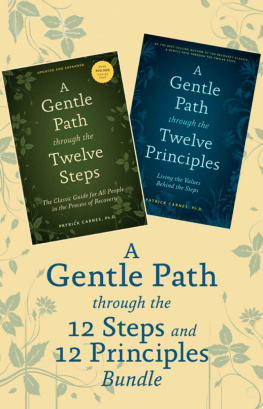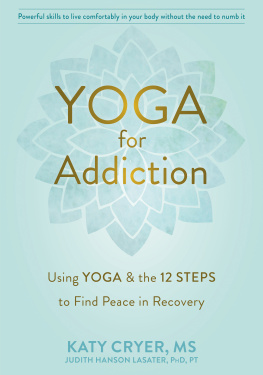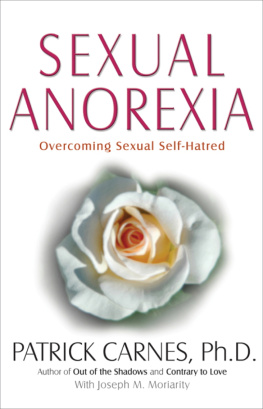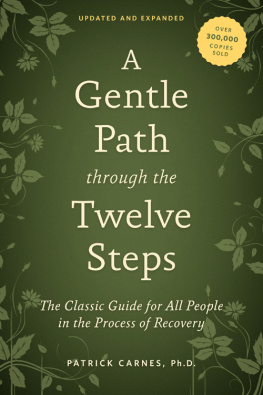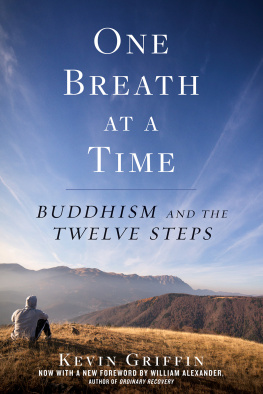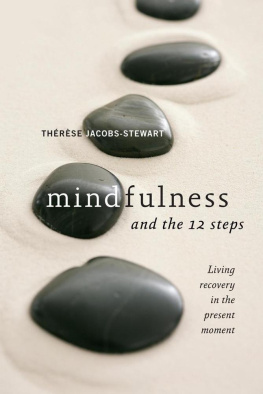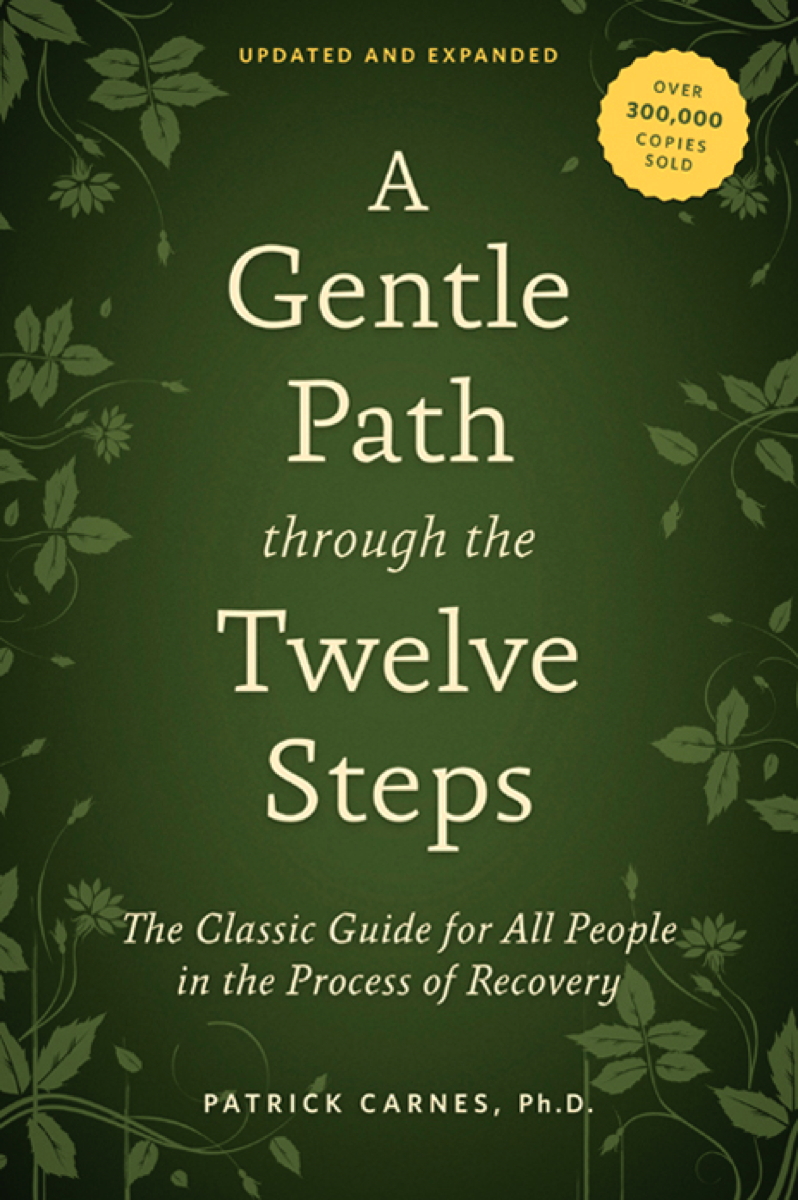A Gentle Path
through the
Twelve Steps
The Classic Guide for All People
in the Process of Recovery
UPDATED AND EXPANDED

Patrick Carnes, Ph.D.

Hazelden Publishing
Center City, Minnesota 55012
800-328-9000
hazelden.org/bookstore
A Gentle Path through the Twelve Steps 1993, 2012 by Patrick J. Carnes, Ph.D.
A Gentle Path through the Twelve Principles 2012 by Patrick J. Carnes, Ph.D.
Electronic bundle edition published 2012
All rights reserved. Produced in the United States of America. No part of this electronic publication may be copied, sold, or redistributed in any form or by any means without the written permission of the publisher. Failure to comply with these terms may expose you to legal action and damages for copyright infringement.
e-book ISBN (for bundle of two books): 978-1-61649-462-9

Contents
Affirmations
Consequences Inventory
Family Tree and Addiction
Addiction History
Abuse Checklist
Step One for Addicts
Step One for Coaddicts
First Step Lessons
Reflections on the First Step
The Recovering Brain
Celebrating Your Progress
Spiritual Care Inventory
Loss-of-Reality Inventory
Paths to Spirituality
Spirituality Affirmations
One-Year-to-Live Fantasy
Letter to Your Higher Power
Reflections on the Second and Third Steps
Fourth Step Inventories
Avoiding Personal Responsibility
Taking Personal Responsibility
Misuse of Anger
Positive Expression of Anger
Paralyzed by Fear
Respect for Fear
Falling into Self-sabotage
Taking Healthy Risks
Shameful Events
Pride in Your Achievements
Losses and Painful Events
Learning from Sadness
Beliefs about Your Unworthiness
Self-hatred
Self-affirmations
Reflections on the Fourth Step
Sharing Step Five: Suggestions for the Turning Point
Fifth Step Reconciliation Rite
Reflections on the Fifth Step
Affirmations
Step Six: Removing Character Defects
Seventh Step Meditation
Personal Craziness Index
Part OnePreparation
Part TwoRecording Your PCI
Part ThreeInterpretation of the PCI
Part FourPCI Meditation
When Crises OccurAcknowledge the Chaos
Reflections on the Sixth and Seventh Steps
Record of Those Harmed and Amends Made
The Healer Within
Meditation
Affirmations
Reflections on the Eighth and Ninth Steps
Partial, Convenient, and Inconvenient Recovery
Balanced Equations: A Ten-Day Exercise for Steps Ten and Eleven
Creating a Life of Congruence
Day One: Happiness = Satisfaction/Desires
Day Two: Growth = Change/Stability
Day Three: Serenity = Boundaries/Options
Day Four: Peace of Mind = Known to Others/Known to Self
Day Five: Reality = Light Side/Dark Side
Day Six: Achievement = Vision/Plan
Day Seven: Intimacy = Fidelity to Self/Fidelity to Others
Day Eight: Productivity = Being/Doing
Day Nine: Health = Awareness/Practice
Day Ten: Spirituality = Mortality/Meaning
Daily Tenth Step Inventory
Affirmations
Reflections on the Tenth Step
Spiritual Quest Planning Sheet
Spiritual Quest Debriefing
Reflections on the Eleventh Step
Twelfth Step Guide Affirmations
Sobriety Worksheets
Gifts of the Spirit
Beginning Again
Reflections on the Twelfth Step
A. The Twelve Traditions of Alcoholics Anonymous
B. A Guide for Group Use
C. The Wisdom of the Big Books
D. Suggested Readings
E. Twelve Step Support Group Information
F. Recovery Resources from Dr. Patrick Carnes and Associates

Introduction to the Updated and Expanded Edition
FOR NEARLY SEVENTY-FIVE years, the Twelve Steps have served as an extraordinary recipe for recovery. Since they were first published in the book Alcoholics Anonymous in 1939, they have had a profound impact far beyond the world of alcoholism, helping tens of millions of people with addictions of all types.
The Twelve Steps have been so useful and translatable because they tap into the essential human process of change and make that process more explicit, more understandable, and more sustainable. I believe that, a century from now, the Twelve Steps will be regarded as one of historys great intellectual and spiritual landmarksone that marked our emergence into a diverse, global society.
The central premise of this bookthat addiction manifests in many forms, extending far beyond drugs and alcoholseems self-evident to contemporary readers. We now know that sex, food, money, work, relationships, shopping, gambling, gaming, and many other aspects of life can all devolve into compulsive behavior, which is the essential component of addiction. We also know that the Twelve Steps can help people with any (or any combination) of these compulsions to recover.
Today we also know that having a combination of addictions is far more common than having only one. Eighty-seven percent of people with addictions have two or more. As one Twelve Step joke notes, if some addicts went to all the meetings they qualified for, theyd do nothing else with their lives.
Twenty-five years ago our awareness was much narrower. In 1987, when the first edition of this book was proposed to publishers, many folks objected heatedly to putting alcoholics and drug addictsor any two groups of people with different addictionstogether in the same room. Many professionals saw alcoholics as very different (and slightly more refined) than drug addicts. Most other forms of addiction were given no credence at all. When I went on Phil Donahues show to talk about sex addiction, the topic was widely perceived as a joke. Back then, looking at Twelve Step life as a wholeacross addictions and fellowshipswas considered a radically new, groundbreaking approach. It threatened many professionals and frightened most publishers, who also believed firmly that people wouldnt buy workbooks.
Eventually I found a publisher (not the current publisher) who would take the risk of publishing A Gentle Path through the Twelve Steps but only if I would also create a set of six audio tapes. The rationale was that the tapes would do well enough to jump-start sales of the bookor, failing that, to at least offset the publishers probable financial loss on the book.
Today, twenty-five years later, A Gentle Path through the Twelve Steps has sold over 350,000 copies worldwide and has become one of its current publishers top-selling books. As for the audio tapes, they did not sell well and have been unavailable for many years. Im not even sure where my own tapes are.
One of the hallmarks of A Gentle Path through the Twelve Steps has been that anybody can use it. It works for all kinds of addicts; it works for coaddicts; it doesnt matter what fellowship you are in. Each edition of the book provides a concrete, structured way to implement what the authors of Alcoholics Anonymous discovered and described in the 1930s. It gives readers a focused path for integrating the Twelve Steps into their lives in a practical, doable way. With each new edition, my goal has been to make that path clearer, more helpful, and more profound.

